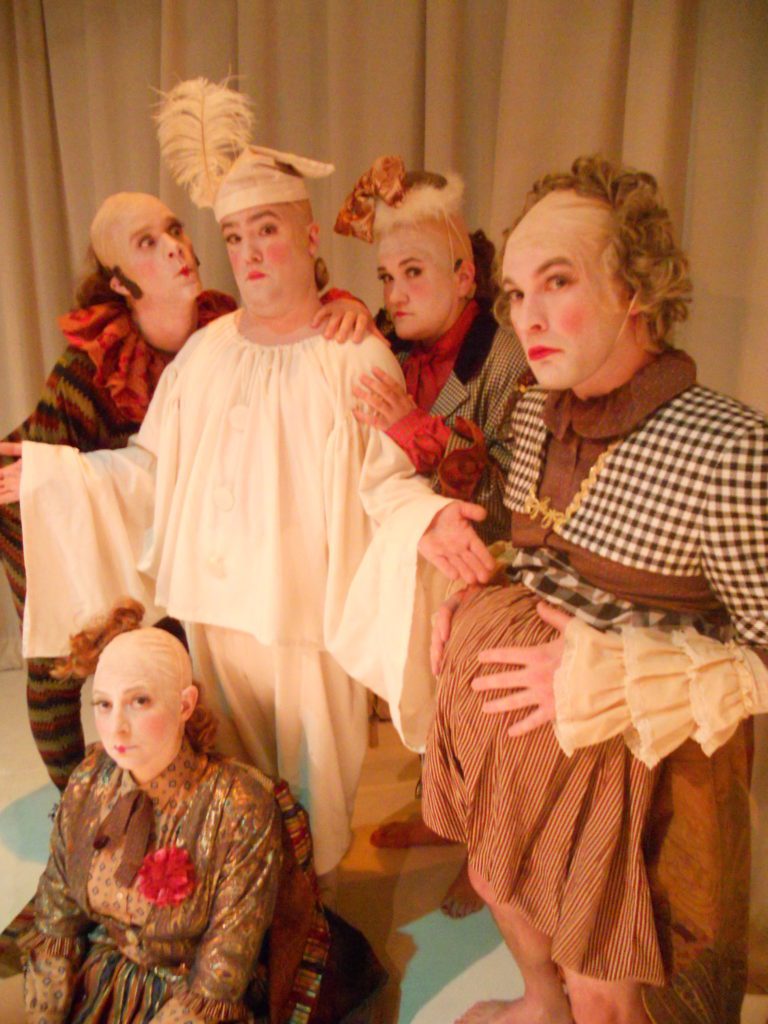Buntport Theater was founded by six graduates of Colorado College in the 1990s. When they went to the dean of Denver theater, Henry Lowenstein, for advice he said, “This will never work.”
The Henry (named after Lowenstein) annual awards nominations were announced on June 15th, and Buntport was nominated for outstanding production of a play, two supporting actors and one supporting actress, two outstanding new play nominations, and one outstanding costume design. This would be a knockout season for any company, and for Buntport, it happens year after year. Lowenstein recently admitted he had been wrong.
Buntport ended a smashing season with The Roast Beef Situation. The play, or perhaps riff, is a new invention, and visits the age old problem of censorship.
The company makes you think thrice or quadrice and quince about this subject of nagging, monumental importance for which neither the state nor artists have yet come up with an answer.
Jumping off from a famous and silly ditty by Henry Fielding about the eternal importance of roast beef in English life, the exploration is deliciously novel. Roast beef enabled the English to eat and fight, “without it they’re good night.” Theater audiences customarily sang about roast beef before and after new plays. The Royal Navy still dines to the tune. You don’t need this background, however, to understand how important roast beef is to the history of censorship.
Carlo Delpini (Brian Colonna) said the word ‘roast beef’ on stage without musical accompaniment, a requirement of the 1737 Licensing Act designed to muzzle political protest in any form. Naked words are banned. This may be why feisty opera composers struggled to have words spoken in their scores.
Delpini was thrown into jail with three equally horrific villains who had bludgeoned their victims to death. You could imagine the three murderers singing out, “Tough Tittie,” as the jailor arrivers with Delpini. Instead they launch into a diatribe on the inevitable inequities of the law. The jailer (Evan Weissman) is the only character with a visible prop, a mallet he uses to call the inmates to attention and also to summon the court when he acts the judge.
All are stock characters from Commedia dell’Arte and ask, “What to do with stock? How do you make stock lively?” The answer is in these tart performances.
In one stage dimension, Delpini is Pierrot. Erik Edborg, the classic love interest Harlequin, joins Duggan, Rollman and Weissman done up in colorful Commedia regalia. Full of humorous physicality like a leg which becomes a shot gun (Delpini cheats at this one, as his shoulder meets his knee) the show is a visual feast.
Themes of theater life erupt. Delpini is jealous of his rival Joseph Grimaldi who played his Friday in a production of Robinson Crusoe. The perils of performance, the danger of language, and even the necessity of repetition are tossed around with wit.
SamManTha Schmitz contributed lighting which softly went from vignette to vignette and was stark at a scenes’ conclusion. Her sound was apt, music provided by a cupped hand, rattling and banging by mallet and other clever devices. Interjected scenes from the Robinson Crusoe production are evoked with images of an island paradise projected flickering on cell bars.
The company is committed to a thoroughly ensemble approach. There is no hierarchy. Written in concert, directed and performed in concert, this clever troop comes up with moments you have never seen before, or even thought about.
We were not able to see another production, Tommy Lee Jones Goes to the Opera Alone, but it was a huge success. It will be reprised for three days at the end of June.
The American Theater Wing honored the Buntport group with a grant last year, noting that Broadway stretches three thousand miles across the country. Broadway could well take a page from this inventive and highly theatrical troop.
-Susan Hall, June 19, 2012, berkshirefinearts.com
